Keeping your pool clean and safe starts with proper chemical storage. Pool chemicals are powerful substances that need careful handling. Storing them the right way is key to avoiding accidents and keeping them effective.
The most important point to be made about the proper storage of pool chemicals is to ensure that they cannot be accessed by children!
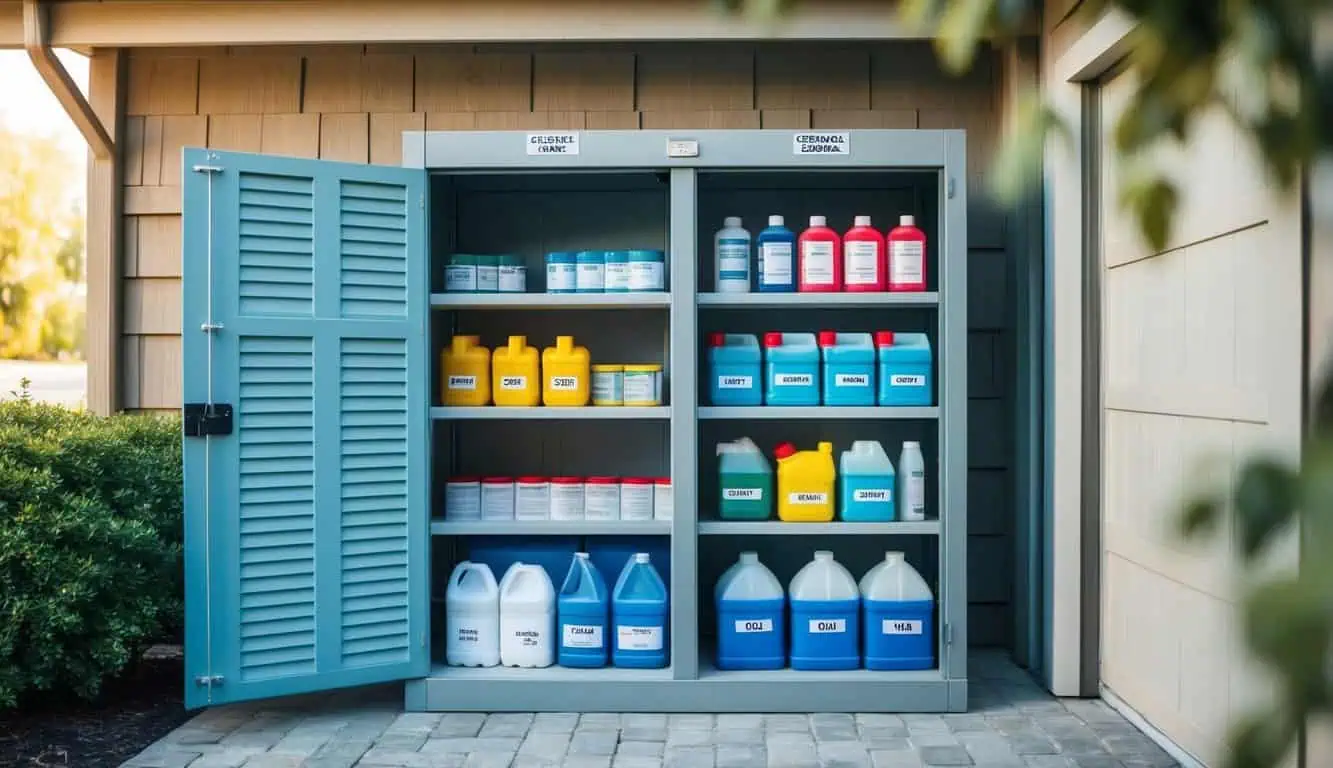
Pool chemicals should be stored in a cool, dry, ventilated area away from your home and pool. A shed or storage unit made for outdoor use works well. Make sure to keep different types of chemicals separate to prevent reactions. Put liquid chemicals on lower shelves and dry ones up higher.
Safety is crucial when dealing with pool chemicals. Always wear gloves and goggles when handling them. Keep chemicals in their original containers with labels intact. Don’t mix different products, as this can cause dangerous reactions. By following these tips, you’ll keep your pool chemicals safe and ready for use.
Key Takeaways
- Store pool chemicals in a cool, dry place away from your home and pool
- Keep different types of chemicals separate to avoid reactions
- Always use safety gear when handling pool chemicals
Understanding Swimming Pool Chemicals
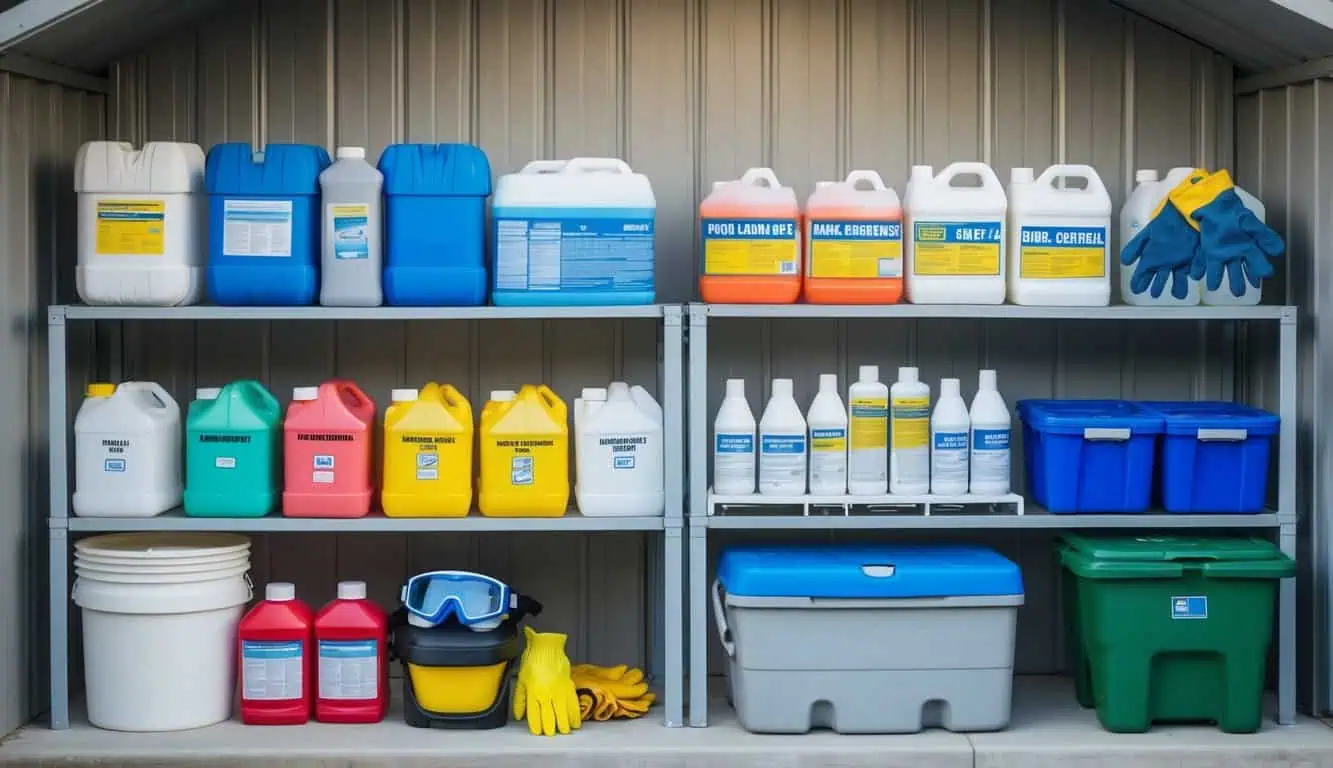
Pool chemicals keep your water clean and safe. They kill germs, balance pH, and prevent algae growth. Let’s look at the main types and how they work together.
Types and Uses
Chlorine is the most common pool sanitizer. It kills bacteria and other harmful microorganisms. You can buy it in liquid, tablet, or granular form.
pH adjusters help keep your water balanced. pH up raises the pH, while pH down lowers it, such as Muriatic acid. Balanced water feels better on your skin and eyes.
Algaecides stop algae from growing in your pool. You use them as a preventive measure or to treat existing algae problems.
Shock treatments give your pool water a boost of sanitizer. You use them after heavy pool use or when the water looks cloudy.
Cyanuric acid is used in pool maintenance as a stabilizer to protect free chlorine from rapid degradation by sunlight, ensuring consistent sanitization.
Chemical Reactions and Compatibility
Pool chemicals can react with each other. This is why you must store them separately and add them to your pool one at a time.
Chlorine and acid should never mix. This can create dangerous chlorine gas. Keep these chemicals far apart in storage and use.
Oxidizers like chlorine can react with organic matter in the water. This is how they kill bacteria and break down contaminants.
Some chemicals may lose strength if stored improperly. Heat, sunlight, and moisture can affect their potency. Always follow the storage instructions on the label.
Choosing the Right Storage Area
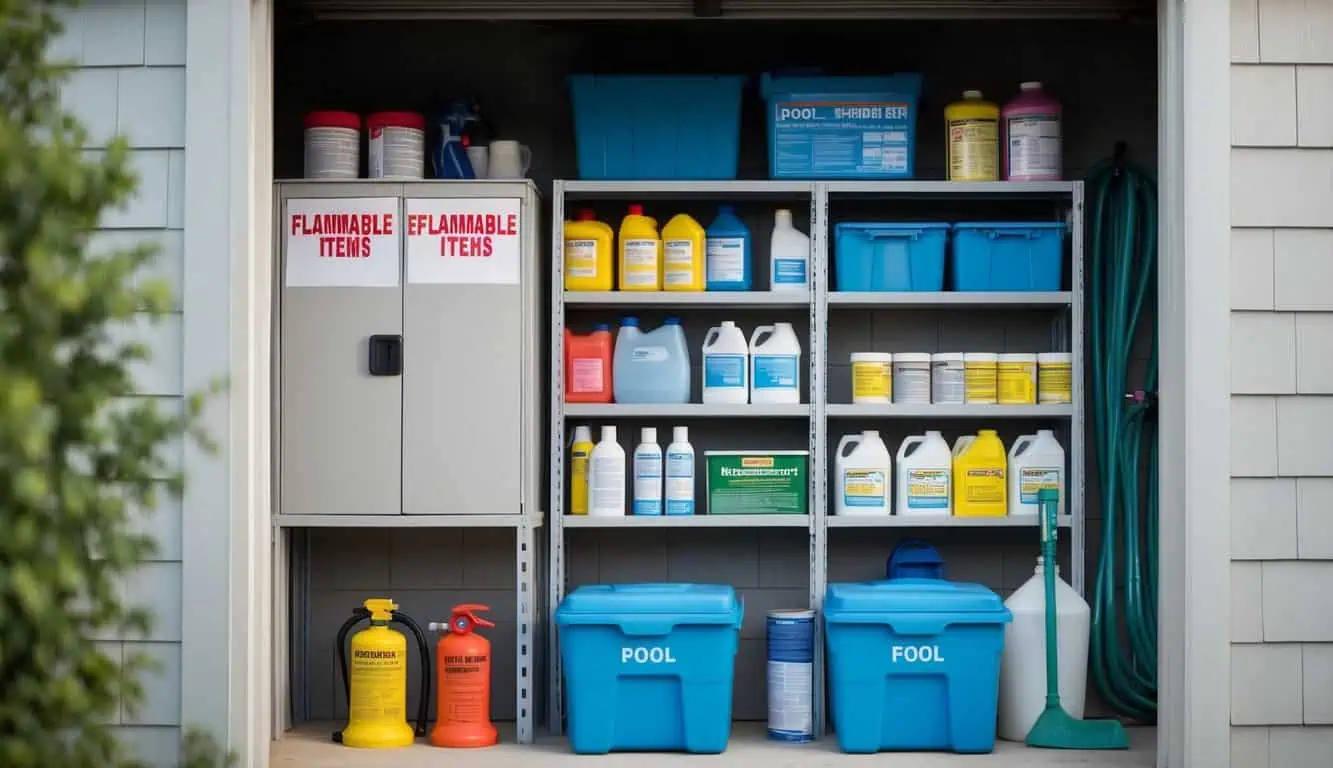
Picking a good spot for your pool chemicals keeps them working well and safe. A smart choice protects you, your family, and your pool.
Light and Temperature Considerations
Keep your pool chemicals away from direct sunlight. Sun can make them break down faster. Find a cool, dark place instead. A shaded corner of your garage or a basement shelf works well.
Extreme temperatures are bad for pool chemicals. Too hot or too cold can change how they work. Aim for a spot that stays between 50°F and 80°F year-round.
Avoid storing chemicals near heaters or in areas that freeze in winter. If your garage gets very hot in summer, look for a different spot. A closet inside your home might be better.
Ventilation Needs
Your storage area needs good air flow. This helps get rid of any fumes that might leak out. A well-ventilated space keeps you safe when you handle the chemicals.
Don’t put pool chemicals in poorly ventilated areas like small closets or sealed cabinets. These spots can trap fumes, which can be dangerous.
If you use a shed, make sure it has vents or windows you can open. For indoor storage, pick a room with a window or fan. This helps air move around.
I keep mine in the pool equipment “house” as it keeps it dry and there is good ventilation.
Remember, some chemicals can make strong smells. Good air flow keeps these odors from building up in your home.
Ideal Storage Conditions Table
| Chemical | Optimal Temp. Range | Humidity | Notes |
|---|---|---|---|
| Chlorine (Solid) | 50°F–80°F (10°C–27°C) | Low Humidity (<50%) | Heat or moisture reduces potency |
| Chlorine (Liquid) | 50°F–80°F (10°C–27°C) | Low Humidity | Keep tightly sealed to prevent off-gassing |
| Acid-Based | 50°F–80°F | Well-ventilated area | Store away from chlorine & metals |
| pH Adjusters | ~50°F–80°F | Low–Moderate Humidity | Follow container instructions |
| Algaecides | 50°F–85°F | Low Humidity | Keep original container sealed |
Note: These ranges are general guidelines; always follow the manufacturer’s specific instructions on the label.
Storing Pool Chemicals Safely
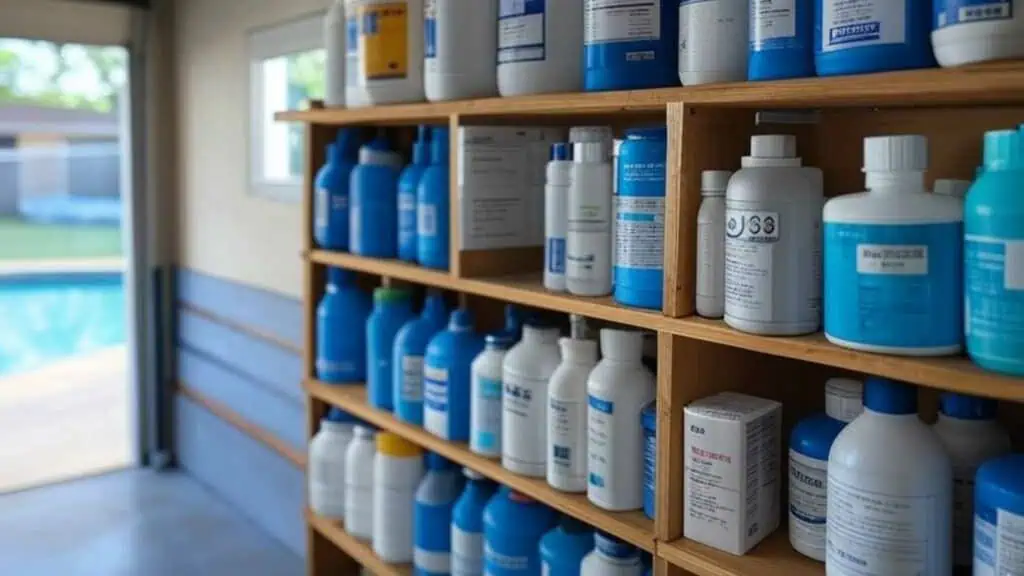
Storing pool chemicals correctly keeps you safe and makes them last longer. It’s important to use the right containers, keep chemicals apart, and label everything clearly.
Use of Original Containers
Always keep your pool chemicals in their original containers. These containers are made to hold the chemicals safely. Don’t move them to other bottles or jars. The original packaging has important info like how to use the chemical and what to do if there’s an accident.
If a container gets damaged, don’t use it. Buy a new one instead. Make sure lids are tight to stop spills and keep moisture out. This helps your chemicals work better for longer.
Separation and Isolation
Keep different types of pool chemicals away from each other. This stops them from mixing by accident, which can be dangerous. Put each kind of chemical in its own storage bin.
Keep chlorine products far from other chemicals. They can react badly with many things. Store acid-based products in a different area too.
Pool Chemical Incompatibility Chart
| Chemical Type | Keep Away From | Reason |
|---|---|---|
| Chlorine Products | Acids (Muriatic Acid), Algaecides | Can produce toxic chlorine gas |
| Acid-Based | Chlorine, Shock Treatments | Dangerous chemical reaction |
| Shock Treatments | Any other chemicals when dissolving | Potential for violent reaction or off-gassing |
| Algaecides | Strong Oxidizers (Chlorine/Shock) | May reduce effectiveness or cause reactions |
Copy this and hang it in your storage area as a reminder.
Securing and Labeling
Lock up your pool chemicals to keep kids and pets safe. A sturdy cabinet with a good lock works well. Make sure the storage area is dry and cool.
Label everything clearly. Write the name of the chemical and the date you bought it on each container. This helps you use older products first.
Use shelves to keep chemicals off the ground. Put heavy items on lower shelves to avoid spills. Keep a clean-up kit nearby just in case.
Make sure your storage area has good air flow. This stops fumes from building up. Never store pool chemicals inside your house or near living areas.
Safe Handling Swimming Pool Chemicals
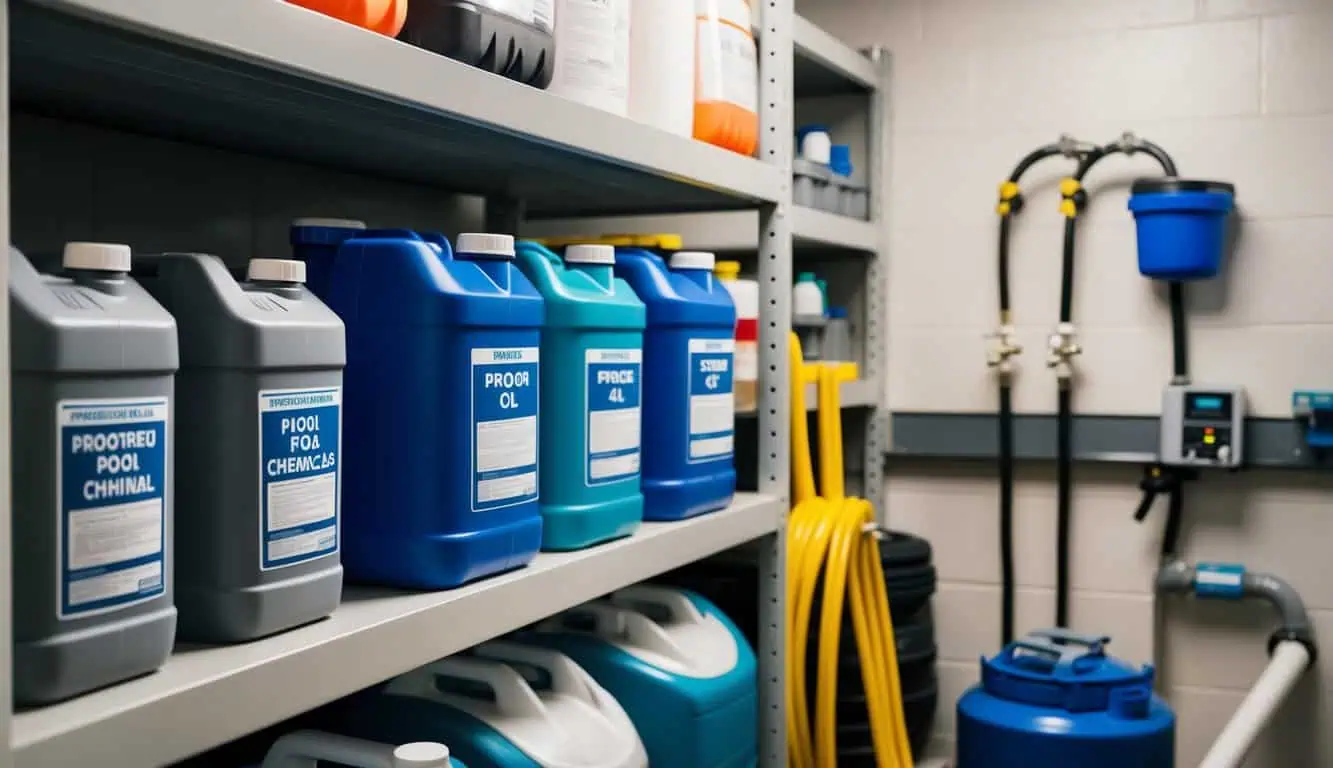
Proper handling of pool chemicals is crucial for your safety and the health of swimmers. Following the right steps can prevent accidents and help you deal with spills quickly.
Preventing Accidents
Always wear safety gear when handling pool chemicals. Put on goggles, gloves, and old clothes to protect yourself. Read labels carefully before using any product. Never mix different chemicals together, as this can cause dangerous reactions.
Store chemicals in a cool, dry place away from sunlight. Keep them out of reach of children and pets. Make sure containers are tightly sealed when not in use. Don’t store liquid chemicals above dry ones to avoid leaks.
Use clean, dry tools for each chemical. This helps stop unwanted mixing. Add chemicals to water, not water to chemicals, to avoid splashing. Work in a well-ventilated area to avoid breathing in fumes.
Dealing with Spills and Leaks
Act fast if you spill chemicals. Put on safety gear right away. For dry spills, sweep up the chemical and put it in a plastic bag. For liquids, use kitty litter or sand to soak it up.
Don’t use water to clean up spills unless the label says it’s safe. Some chemicals react badly with water. If chemicals mix by accident, leave the area and call for help.
Keep a spill kit ready. Include items like gloves, goggles, and absorbent materials. Know where your safety shower or eyewash station is. If chemicals get on your skin or in your eyes, rinse with lots of water for 15 minutes.
Frequently Asked Questions
Storing pool chemicals properly is crucial for safety and effectiveness. Let’s look at some common questions about storage practices.
What’s the safest way to store pool chemicals during winter?
Keep pool chemicals in a cool, dry place during winter. A locked shed or storage room works well. Make sure the area stays above freezing. Remove chemicals from outdoor spaces or unheated garages.
Can you store your pool chemicals in the garage, or is it unsafe?
You can store pool chemicals in a garage if it’s dry and well-ventilated. Keep them off the floor on a shelf. Make sure they’re away from cars, tools, and other items. Lock them up if kids or pets can access the garage.
Are there any regulations to consider when storing pool chemicals?
Check your local laws for rules on chemical storage. Some areas have limits on how much you can store at home. You may need special containers or labels. Ask your pool store or local fire department about regulations in your area.
What kind of container should I use for chlorine storage?
Use the original container for chlorine storage. If you need to transfer it, pick a plastic container made for pool chemicals. Never use metal containers. Make sure the lid seals tightly. Label the container clearly with the chemical name and date.
Is it a good idea to keep pool chemicals in a deck box?
A deck box isn’t ideal for pool chemical storage. In a deck box the chemicals can experience extreme temperatures and humidity. Chemicals might leak or create fumes. This could damage your deck. It’s better to store chemicals in a cool, dry place away from your pool area.
Pool chemical storage tips for a hot climate like Texas?
In hot climates, find a cool spot for chemical storage. A shaded area or air-conditioned space works best. Keep chemicals off concrete floors that heat up. Use fans for air flow. Check containers often for signs of heat damage or leaks.
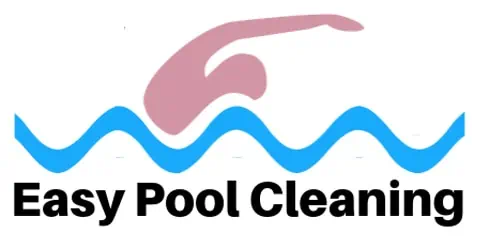
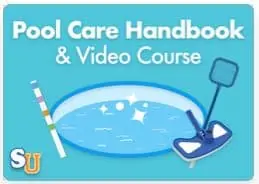
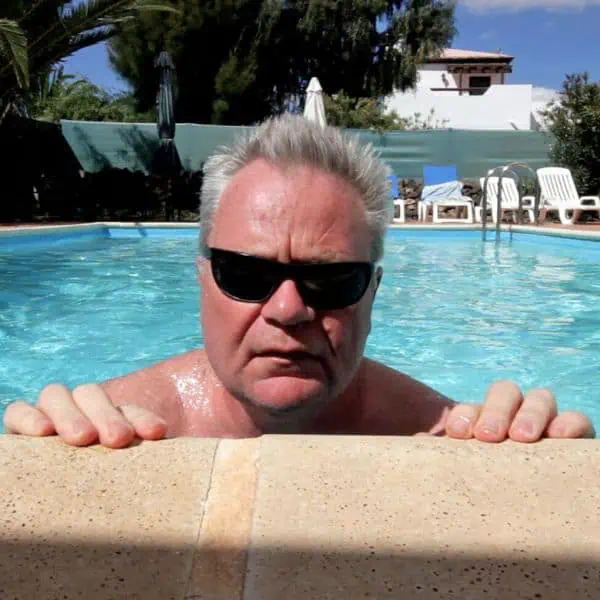
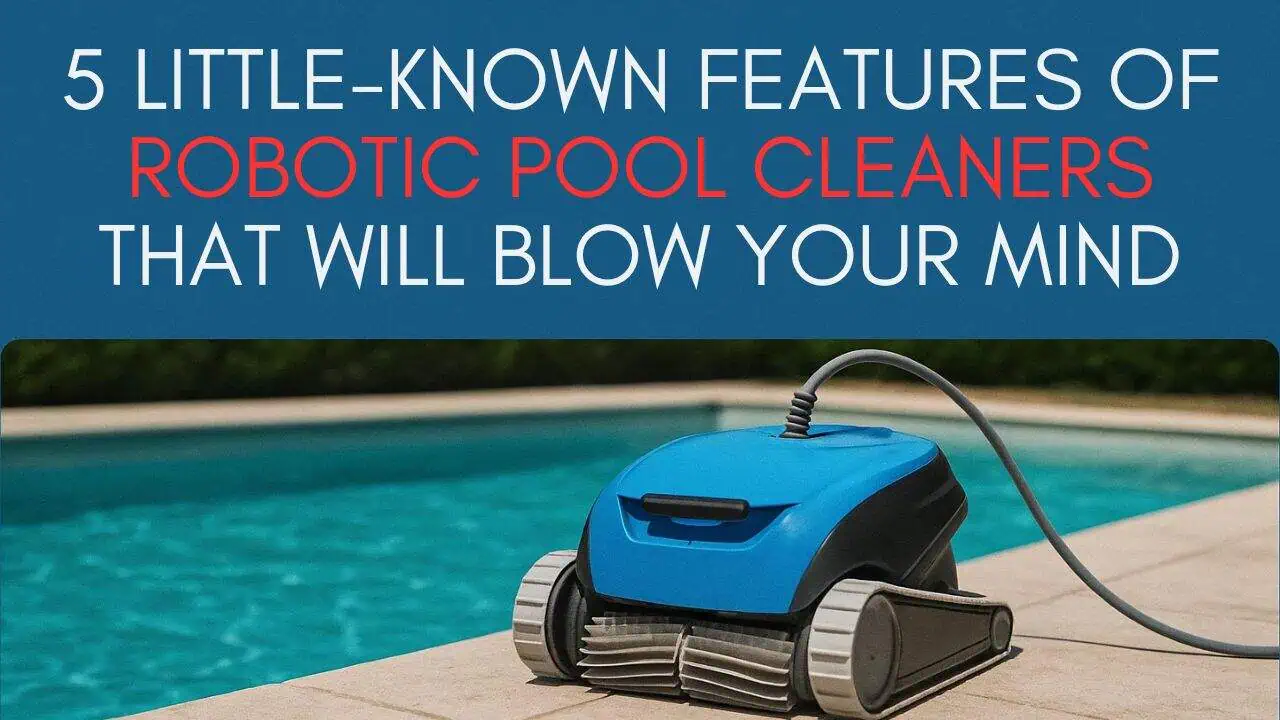
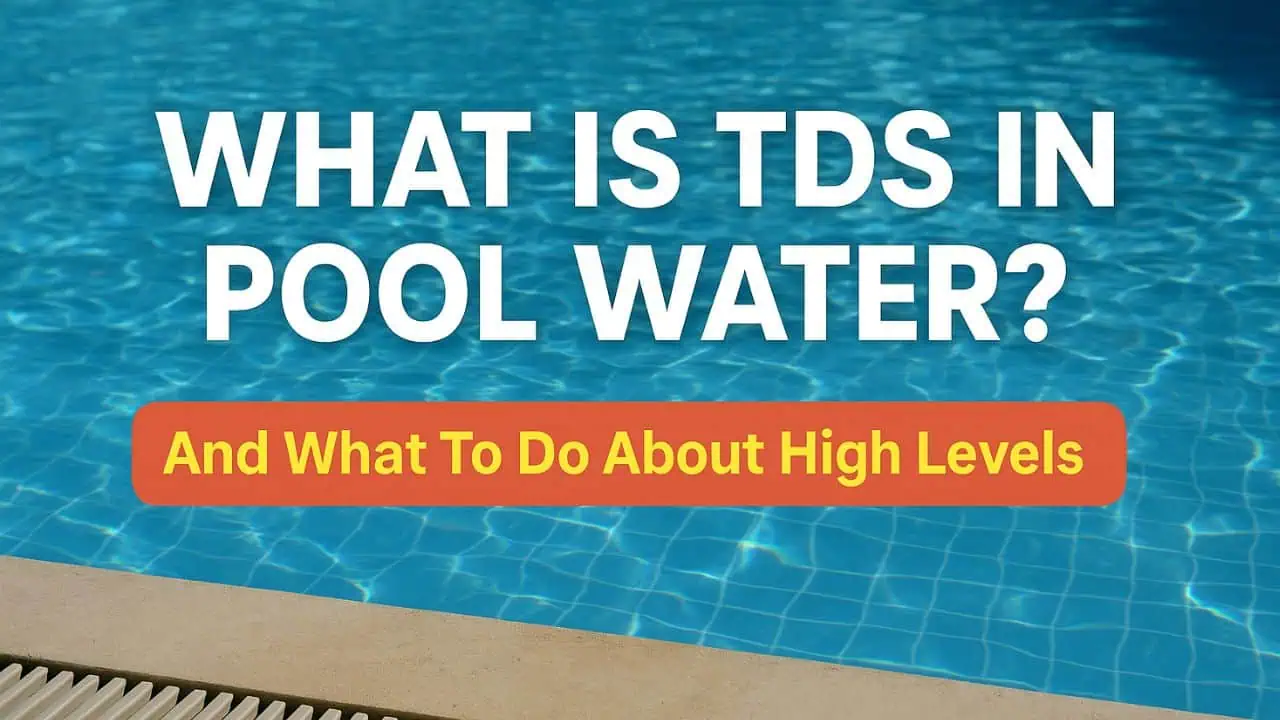
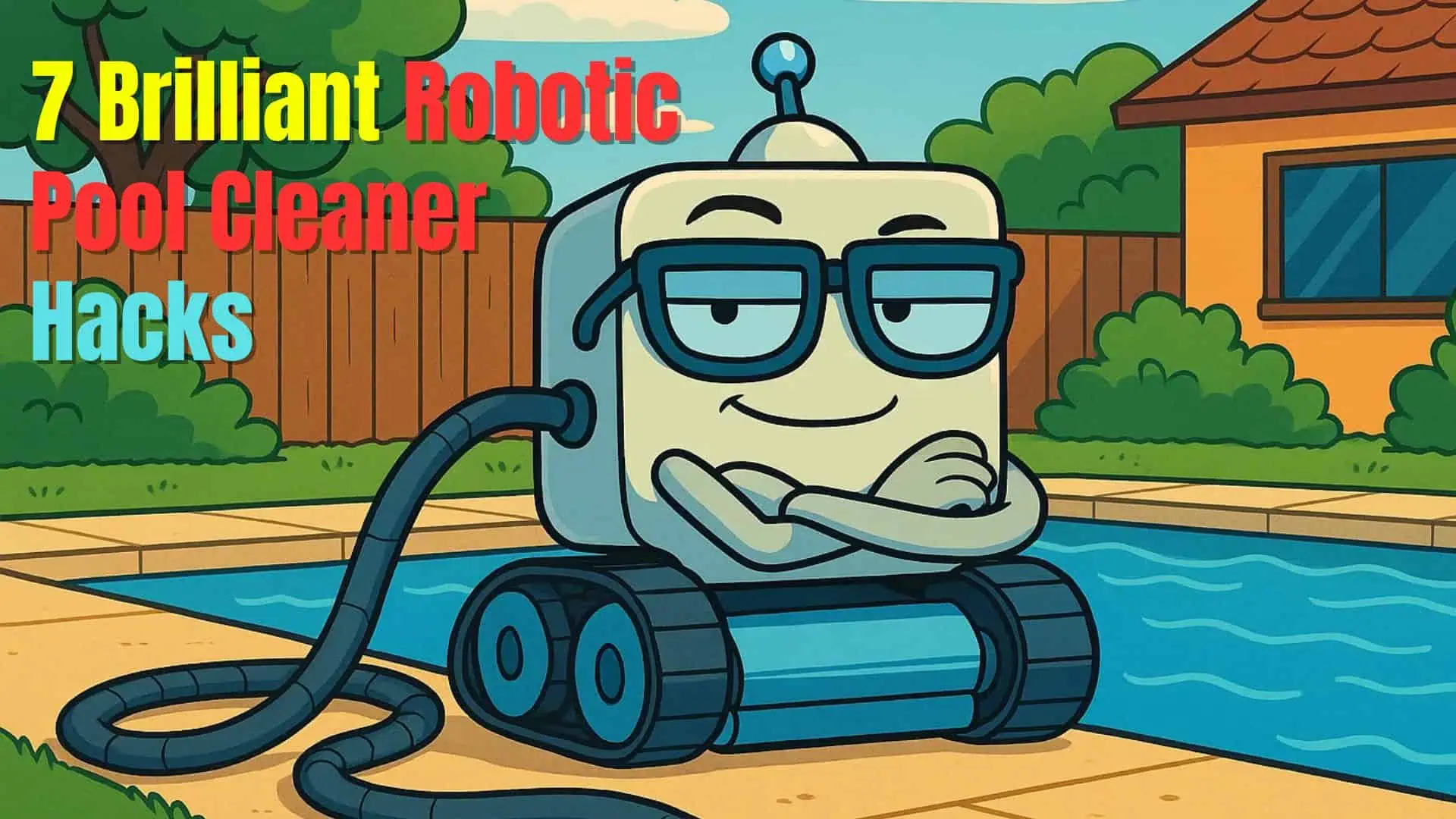
Leave a Reply